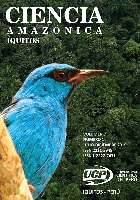
Ciencia Amazonica
Scope & Guideline
Advancing Knowledge for a Sustainable Amazon
Introduction
Aims and Scopes
- Biodiversity and Species Studies:
The journal focuses on the documentation and analysis of species diversity, including birds, mammals, reptiles, and plants, particularly in the Amazon basin. This includes studies on abundance, distribution, and ecological relationships among species. - Environmental Impact Assessments:
Research often investigates the environmental impacts of human activities, such as pollution, deforestation, and urbanization, assessing their effects on local ecosystems and species. - Conservation and Sustainable Practices:
Ciencia Amazonica emphasizes studies that contribute to the conservation of biodiversity and sustainable management of natural resources, including indigenous knowledge and practices. - Ecological and Biochemical Research:
The journal publishes research on ecological interactions and biochemical properties of plants and animals, including studies on medicinal plants and their effects on health. - Socio-Ecological Dynamics:
Research often explores the interactions between human communities and their environments, focusing on environmental awareness, resource use, and cultural practices.
Trending and Emerging
- Climate Change and Ecological Responses:
There is an increasing focus on how climate change affects biodiversity and ecosystem dynamics in the Amazon, highlighting the need for studies that assess these impacts on local flora and fauna. - Indigenous Knowledge and Resource Management:
Research that incorporates indigenous perspectives and traditional ecological knowledge has gained traction, emphasizing the importance of local practices in conservation and sustainable resource management. - Health and Environmental Interactions:
Emerging themes include the study of the impact of environmental factors on public health, as seen in research related to wild meat consumption and its microbiological implications during the COVID-19 pandemic. - Ecological Restoration and Rehabilitation:
There is a growing interest in studies that address ecological restoration efforts, focusing on the recovery of degraded areas and the sustainability of ecosystems in the Amazon. - Microbial and Biochemical Research:
The exploration of the biochemical properties of Amazonian plants and their potential health benefits is becoming increasingly relevant, with studies focusing on antimicrobial properties and health impacts.
Declining or Waning
- Urban Environmental Studies:
While the journal initially featured several studies on urban environmental issues, such as waste management and pollution in cities like Iquitos, these topics have appeared less frequently in recent publications. - Agricultural Practices and Impacts:
Research focused on the impacts of traditional agricultural practices on biodiversity and ecosystems has decreased, suggesting a shift towards more direct conservation and ecological studies. - Invasive Species Research:
The exploration of invasive species and their effects on native ecosystems has become less common, possibly indicating a reduced focus on this area in favor of other pressing ecological concerns.
Similar Journals
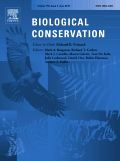
BIOLOGICAL CONSERVATION
Empowering Conservation Through Cutting-Edge Research.BIOLOGICAL CONSERVATION, published by Elsevier Science Ltd, is a leading international journal dedicated to advancing the science and practice of biological conservation. Since its inception in 1968, the journal has provided a critical platform for researchers, professionals, and students in the fields of Ecology, Evolution, Behavior, and Systematics as well as Nature and Landscape Conservation. With an impressive impact factor, and ranked in the Q1 category within both ecological and conservation domains in 2023, it emphasizes high-quality empirical and theoretical research essential for understanding and addressing pressing environmental challenges. Although it follows a subscription model, the journal is known for its rigorous peer-reviewed articles that contribute significantly to the field, ensuring that the latest findings and methodologies are readily accessible to practitioners. As a vital resource for those engaged in conservation efforts globally, BIOLOGICAL CONSERVATION stands out for its commitment to enhancing knowledge and informing strategies that safeguard biodiversity across ecosystems.

Diversity-Basel
Transforming knowledge into action for a thriving ecosystem.Diversity-Basel is a premier open-access journal published by MDPI, specializing in the vital fields of agricultural, biological, and ecological sciences. Launched in 2009, this multidisciplinary journal, operating from Switzerland, aims to disseminate high-quality research that advances the understanding of biodiversity and ecosystem dynamics. With an impressive impact factor and notable rankings in Scopus, including Q1 classification in Agricultural and Biological Sciences and strong positions in Ecology and Ecological Modeling, Diversity-Basel stands as a valuable resource for global researchers, professionals, and students alike. Its commitment to accessibility enables researchers to reach a wider audience, fostering collaboration and innovation in addressing pressing environmental challenges. By providing an inclusive platform for diverse scientific inquiries and innovations, Diversity-Basel plays an essential role in shaping the discourse on biodiversity conservation and management, encouraging the pursuit of sustainable solutions in our rapidly changing world.

Acta Brasiliensis
Empowering Research in Brazilian Studies for a Global AudienceActa Brasiliensis is an esteemed academic journal published by the Federal University of Campina Grande. With an ISSN of 2526-432X and an E-ISSN of 2526-4338, this open access journal has been fostering scholarly communication in the field of Brazilian studies since its inception in 2017. Acta Brasiliensis aims to disseminate high-quality research by providing a platform for scholars, professionals, and students to share their work related to various aspects of Brazilian culture, society, and development. The journal's commitment to open access ensures that its content is freely available, promoting wider accessibility and engagement within the academic community. With a growing reputation in the landscape of scientific research, Acta Brasiliensis is poised to make significant contributions to the understanding of Brazilian studies, thereby advancing discourse and collaboration among researchers worldwide.

North-Western Journal of Zoology
Pioneering Research in the Heart of Animal ScienceNorth-Western Journal of Zoology is a prominent scholarly publication dedicated to the field of zoology, fostering a vibrant exchange of research findings and insights among scientists, professionals, and students. Published by UNIV ORADEA PUBL HOUSE in Romania, this journal has been a reliable source for advancing knowledge in Animal Science and Zoology since its inception in 2008, with its publications spanning until 2024. With an engaging focus on innovative research and review articles, the journal proudly holds a Q3 quartile ranking in its category for 2023, positioning itself within the competitive landscape of Scopus Ranks. Although currently lacking an open-access model, the journal provides a valuable platform for disseminating critical findings essential to understanding animal biology and ecology. Researchers contributing to this journal benefit from a dedicated readership, furthering the discussion and practical applications of their work in diverse contexts.
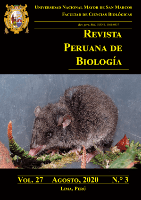
REVISTA PERUANA DE BIOLOGIA
Exploring Diversity in Biological Research Since 1974REVISTA PERUANA DE BIOLOGIA, an esteemed journal published by the Universidad Nacional Mayor de San Marcos, Faculty of Biological Sciences, has been a vital platform for disseminating significant biological research since its inception in 1974. With an Open Access model, this journal ensures that high-quality research is freely available to readers across the globe, fostering the advancement of knowledge within the field of agricultural and biological sciences. Despite proprietary challenges, the journal has secured a respectable Q3 category ranking in Agricultural and Biological Sciences and currently holds a 137th rank in Scopus among its peers. By embracing a comprehensive scope, REVISTA PERUANA DE BIOLOGIA encourages submissions that contribute to diverse biological topics, making it an essential resource for researchers, professionals, and students looking to enhance their understanding and expertise. With its ongoing commitment to excellence, this journal remains a cornerstone of biological research in Peru and beyond, reinforcing the importance of collaboration and knowledge sharing in the scientific community.
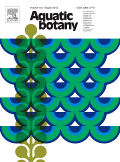
AQUATIC BOTANY
Bridging the gap between science and sustainability.Aquatic Botany, published by Elsevier, stands as an influential scholarly journal in the fields of Aquatic Science and Plant Science. Established in 1975, this esteemed journal has maintained a strong commitment to advancing our understanding of aquatic plant life, providing a platform for high-quality research that contributes to both ecological awareness and the sustainable management of aquatic ecosystems. With its impact factor reflecting a commendable ranking in the Scopus database—#169 in Plant Science and #95 in Aquatic Science—it is recognized for its valuable contributions to the scientific community, evidenced by its Q2 quartile ranking in both categories as of 2023. The journal does not currently offer open access, ensuring rigorous review and scholarly integrity while being accessible through institutional subscriptions. Set against the backdrop of the Netherlands, Aquatic Botany continues to be a vital resource for researchers, professionals, and students looking to explore the complex interactions between aquatic flora and their environment, aiming to inspire innovative ideas and practical solutions for aquatic conservation and management.
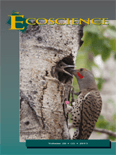
ECOSCIENCE
Fostering a community passionate about ecological advancements.ECOSCIENCE, published by Taylor & Francis Inc, stands as a prominent journal in the fields of Ecology and Environmental Science, recognized for its commitment to advancing knowledge since its inception in 1994. With an ISSN of 1195-6860 and an E-ISSN of 2376-7626, the journal caters to a diverse audience of researchers, professionals, and students passionate about ecological and environmental issues. In 2023, it achieved Q2 and Q3 rankings in the Scopus category of Ecology and Evolution, Behavior and Systematics, reflecting its significance within the academic community. Moreover, ECOSCIENCE occupies notable positions in Scopus rankings, including Rank #324 in Agricultural and Biological Sciences and Rank #210 in Environmental Science, symbolizing its role as a catalyst for disseminating high-quality research. Although currently not open access, the journal's multifaceted scope encourages in-depth discussions on ecological diversity, conservation strategies, and sustainable practices, making it an invaluable resource for those engaged in ecological research and practice.

Journal of Fish and Wildlife Management
Empowering biodiversity through critical insights.The Journal of Fish and Wildlife Management, published by the U.S. Fish & Wildlife Service, serves as a vital resource for scholars, researchers, and professionals in the fields of Animal Science, Ecology, and Conservation Biology. With its ISSN 1944-687X, this esteemed journal has been disseminating critical research findings since 2010, contributing significantly to the understanding of fish and wildlife conservation practices and their ecological impacts. Despite its Q3 category rankings in various disciplines as of 2023, it provides a platform for innovative research that influences policy and management strategies for biodiversity conservation. The journal, although not open access, remains committed to advancing the scientific discourse surrounding wildlife management with articles that emphasize practical conservation efforts and ecological sustainability. Readers can expect a diverse range of articles that promote best practices in the management and conservation of fish and wildlife resources, furthering our collective mission of preserving ecological health and biodiversity for future generations.
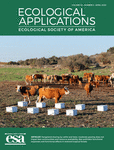
ECOLOGICAL APPLICATIONS
Shaping ecological policies through rigorous scholarship.ECOLOGICAL APPLICATIONS, published by WILEY, is a leading journal in the field of ecology, providing a platform for innovative research that addresses the understanding and management of ecological systems. With an ISSN of 1051-0761 and E-ISSN of 1939-5582, it has established itself as a vital resource for ecologists and environmental scientists since its inception in 1991. Ranked in the top quartile (Q1) for Ecology in 2023 and with a Scopus ranking of 40 out of 461 in Environmental Science, ECOLOGICAL APPLICATIONS boasts an impressive impact factor, attesting to its significance and influence in the field. The journal's mission is to publish peer-reviewed articles that contribute to ecological theory and its applications in conservation and environmental management. Researchers, professionals, and students alike will find invaluable insights and the latest developments in ecological research through its comprehensive scope and rigorous scholarship, ensuring a crucial role in shaping future ecological practices and policies.

Contemporary Problems of Ecology
Shaping the Future of Environmental ScienceContemporary Problems of Ecology, published by MAIK NAUKA/INTERPERIODICA/SPRINGER, is a premier journal committed to advancing research in the field of Environmental Science. Since its inception in 2008, this journal has carved a niche for itself in addressing the pressing ecological challenges of our times, catering to an audience comprising researchers, professionals, and students dedicated to the sustainability and environmental health of our planet. The journal is indexed in Scopus, with a current ranking of #165 out of 233 in the Environmental Science category, reflecting its contributions to the academic community, despite its position in the 29th percentile. With the latest quartile ranking placing it in Q3 for miscellaneous Environmental Science from 2023, the journal continues to be a vital resource for disseminating innovative research findings. Contemporary Problems of Ecology promotes open access scholarship and aims to foster a dialogue among experts, making it an essential platform for those looking to engage with contemporary ecological issues and solutions. The journal actively seeks to publish original research articles, reviews, and case studies that push the boundaries of our understanding of environmental systems.